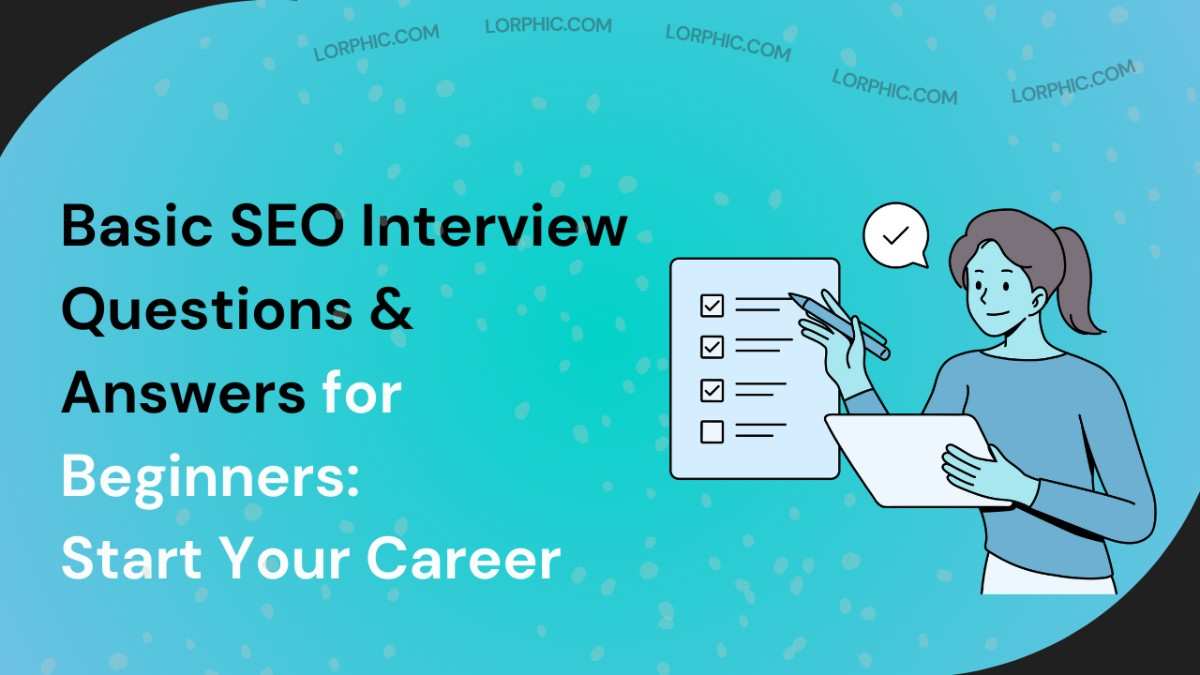Getting that first SEO job can be thrilling, but the interview can be daunting. The hiring managers will want to ensure that you understand the basics. If you are able to answer basic SEO interview questions confidently, you’ll be demonstrating that you possess the building blocks of knowledge required to excel and learn within the position.
This tutorial will take you through some of the most frequently encountered entry-level SEO interview questions. We will explain the answers simply and concisely so that you will be well-prepared, feeling confident, and ready to kick-start your career on a positive note.
Understanding the Basics of SEO
Search Engine Optimization (SEO) is the process of improving a website’s visibility on search engines like Google. It combines technical knowledge, content creation, and an understanding of user behavior to help businesses reach the right audience.
For beginners, the focus should be on learning the core concepts, how search engines crawl and index websites, how keywords influence rankings, and why quality content and backlinks matter.
In interviews, employers look for candidates who understand these fundamentals and show curiosity about how SEO works. Demonstrating a logical approach to problem-solving and an eagerness to learn new strategies can set you apart, even if you’re just starting out.
Common Basic SEO Interview Questions and Answers
Here are 13 fundamental questions you’re likely to encounter, along with sample answers to help you frame your own responses.
What is SEO and Why is It Important?
SEO (Search Engine Optimization) means improving your website so it appears higher in search results and attracts more visitors naturally, without paid ads.
It’s important because it makes your website more visible to people who are actively searching for the solutions, products, or services you offer. A strong SEO strategy builds credibility and trust with users, improves user experience, and can deliver a high return on investment over time. By ranking higher on search engines like Google, a business can attract more relevant customers without paying for ads.
What are the Main Types of SEO?
There are three main categories of SEO, and a successful strategy requires attention to all of them:
- On-Page SEO: This involves optimizing individual web pages to rank higher and earn more relevant traffic. It involves factors such as how good your content is, the keywords you use, and the way your website’s code (like HTML tags) is set up.
- Off-Page SEO: This refers to actions taken outside of your own website to impact your rankings. The primary focus of off-page SEO is building high-quality backlinks from other reputable sites.
- Technical SEO: This deals with the technical aspects of a website to help search engines crawl and index it more effectively. It includes things like site speed, mobile-friendliness, and site architecture.
What’s the Difference Between On-Page and Off-Page SEO?
Think of it this way: on-page SEO is what you do directly on your website, while off-page SEO is about building your site’s reputation around the web.
| On-page SEO | Off-page SEO |
| On-page SEO includes optimizing content, title tags, meta descriptions, and internal links. You have direct control over these factors. | Off-page SEO primarily involves earning backlinks from other websites to yours. These backlinks work like endorsements from other websites, showing search engines that your content is reliable, useful, and worth ranking higher. |
What is a Search Engine and How Does It Work?
A search engine is a software system designed to carry out web searches. It scours the internet for content and organizes it in a massive database. When a user types a query, the search engine provides a list of relevant results.
This process works in three main stages:
- Crawling: Search engines use bots (also known as crawlers or spiders) to discover publicly available webpages.
- Indexing: They analyze the content on those pages and store the information in a huge database called an index.
- Ranking: When a user performs a search, the engine’s algorithm sifts through the index to find the most relevant and high-quality results and displays them in order.
What are Keywords and Why Do They Matter?
Keywords are the terms and phrases that individuals enter into search engines. They are fundamental to SEO because they connect what people are searching for with the content you are providing. By understanding and using the right keywords, you can ensure your website appears in front of an audience that is actively interested in what you have to offer.
How Do You Choose the Right Keywords for a Website?
Choosing the right keywords involves research and strategy. It’s not just about finding terms with high search volume. A good process includes:
- Brainstorming: Start by thinking like your customer. What words would they enter to discover your services or products?
- Using Keyword Research Tools: Tools like Ahrefs, SEMrush, or even Google’s free Keyword Planner can provide data on search volume, competition, and related keywords.
- Analyzing Search Intent: Understand what the user wants to accomplish. Are they looking to buy something (transactional intent), find information (informational intent), or navigate to a specific site (navigational intent)?
- Considering Long-Tail Keywords: These are longer, more specific phrases (e.g., “best running shoes for flat feet”) that typically have lower search volume but higher conversion rates because the searcher’s intent is very clear.
What is the Difference Between Organic and Paid Results?
Organic results are the “natural” listings that appear on a search engine results page (SERP) because the search engine’s algorithm has determined they are the most relevant answer to a query. You don’t pay to be in these spots; you earn them through good SEO.
Paid results, on the other hand, are advertisements. Businesses pay to have their links appear at the top of the SERP, and these are typically labeled with “Ad” or “Sponsored.”
What are Meta Tags and Why Do They Matter?
Meta tags are lines of text that tell a page’s content; they do not show up on the page but appear in the code of the page. The two most important ones for SEO are:
Title Tag: This is the title of the webpage that appears in the browser tab and on the SERP. It’s a critical ranking factor and a key element in attracting clicks.
Meta Description: This is the short summary of the page that appears under the title tag on the SERP. While not a direct ranking factor, a compelling meta description encourages users to click on your link.
What is a Backlink and Why is It Useful?
A backlink is simply a hyperlink placed on one website that directs users to another site. Search engines such as Google consider backlinks to be endorsements. If a reputable website links to your page, it signals that your content is trustworthy and valuable. A strong backlink profile, meaning links from a variety of high-quality, relevant sites, can significantly improve your website’s authority and search rankings.
What is a Sitemap and Why Should a Website Have One?
A sitemap is a file that lists all the important pages, videos, and resources on your website and shows how they’re connected. It helps search engines understand your site’s structure so they can crawl and index your content more efficiently. Essentially, it’s a roadmap of your website that helps search engines find and index all of your important content, ensuring that nothing gets overlooked.
What is the Role of Robots.txt in SEO?
The robots.txt file is a text file that tells search engine crawlers which pages or files on a site they can or cannot access. It’s used to prevent crawlers from accessing certain areas, such as staging sites, admin pages, or thin content pages that you don’t want to appear in search results. This helps manage “crawl budget” and ensures search engines focus on your most important content.
What are Common SEO Tools Used by Beginners?
There is a wide range of tools available, but some of the most user-friendly and essential for beginners include:
- Google Analytics: For tracking website traffic and user behavior.
- Google Search Console: For monitoring your site’s performance in Google search, including clicks, impressions, and indexing issues.
- Google Keyword Planner: A free tool for basic keyword research.
- Ahrefs or SEMrush: Comprehensive SEO platforms for backlink analysis, keyword research, and competitor analysis (they have free versions with limited features).
How Do You Measure the Success of an SEO Campaign?
Measuring success depends on the campaign’s goals, but common key performance indicators (KPIs) include:
- Organic Traffic: An increase in visitors coming from search engines.
- Keyword Rankings: Improvement in rankings for target keywords.
- Conversion Rate: The percentage of visitors who complete a desired action, like making a purchase or filling out a form.
- Bounce Rate: The percentage of visitors who leave a site after viewing only one page. A lower bounce rate often indicates more engaging content.
- Backlinks: The number and quality of new links acquired.
Final Thoughts
Preparing for an SEO interview is about more than just memorizing definitions. It’s about showing that you understand the “why” behind each concept. Use these questions as a starting point to build your confidence and refine your answers. Remember to connect your responses to business goals and express a genuine passion for learning and growing in the field. With a solid grasp of these fundamentals, you’ll be well on your way to impressing your future employer.




